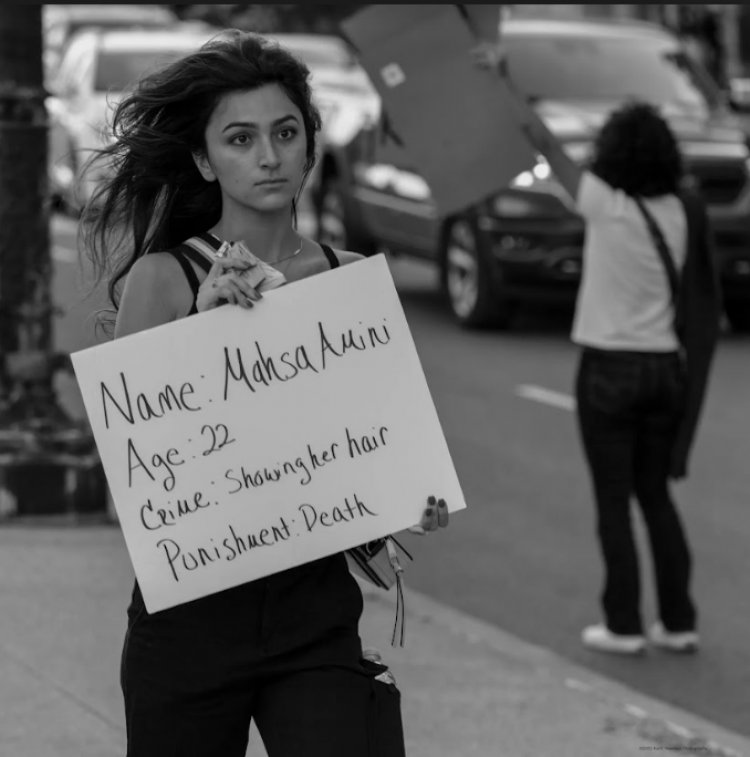Vague remarks raise scepticism: did Iran really abolish its morality police?

Idil Igdir
Women’s Rights Researcher,
Global Human Right Defence.
On Saturday, December 3, Iran's Attorney General Mohammad Jafar Montazeri triggered a discussion about Iran's morality police following remarks he made at a religious conference (France24, 2022). Montazeri said that "the morality police have no connection with the judiciary and that they have been shut down by the same place that it had been launched from in the past" (Motamedi, 2022). Numerous media outlets thus interpreted Montazeri's remarks as the abolition of Iran's notorious vice squad in the country. These vague and ambiguous statements have sparked controversy and led the world to wonder whether Iran has indeed abolished its Guidance Patrol*, or whether Montazeri's comments are simply a way to test the waters to see if it will make a difference in the ongoing national protests.
Skepticism was further fuelled when Iranian lawmaker Nezamoddin Mousavi struck a conciliatory tone, saying the Iranian government is “paying attention to the people’s demand," a day after an official suggested the country's morality police had been shut down (Lu, 2022). Yet, while the world woke up to the headlines "Morality Police Abolished in Iran" and greeted this encouraging news, it didn't take long for Iran's state-run newspaper al-Alam to deny the claims just a day later (Fazali, 2022). It’s been reported on Monday, December 5, that the words of Montazeri had taken out of context, hence Iran’s justice department would “continue to monitor public behaviour” (Von Hein, 2022).
Jason Brodsky, political director of United Against Nuclear Iran, stressed on Twitter that "suspension of operations does not mean abolition; the Attorney General does not oversee the morality police and would not be the one to make the announcement" (Fazeli , 2022)
Although the hijab became mandatory in Iran in 1983, after the 1979 Islamic revolution that overthrew the U.S.-backed monarchy, there have never been any guidelines or specifics on what type of clothing is “inappropriate'', allowing the morality police to arbitrarily detain women (Ghaedi, 2022). Thus, the role of these units remains controversial for many, even among presidential candidates (Le Monde, 2022). While under former moderate President Hassan Rouhani it was common to see women wearing tight jeans with loose, colourful headscarves, with the ultra-conservative successor Mr. Raisi, all of the country's institutions have been called upon to mobilize to enforce the headscarf law.
The unrest ignited by the death of 22-year-old Kurdish woman Mahsa Amini in September has been growing rather than abating over the past three months, contrary to the Iranian government's expectations. When Mahsa Amini died on September 16 after being arrested by the morality police for wearing an "inappropriate" hijab, Iranian women fearlessly and undauntedly took to the streets and began chanting "Women, Life, Freedom," marking the 21st century not only for Iran but for all women around the world. But since the outbreak of the anti-government protests, labeled as “riots" by the Iranian authorities, the security forces have intensified the crackdown to quell the unprecedented situation in the country.
Once the world gave the international stage to Iranian women, the internet was cut off and blocked by the Iranian government, in an effort to trap and isolate the protesters. They even went so far as to sentence the protesters to death. On November 14, an Iranian court handed down its first death sentence to a person arrested for participating in the protest (Gritten, 2022). Figures vary on the number of people killed since the outbreak of events, but according to Iran International, at least 402 protesters have been killed by security forces (Iraninternational, 2022).
*The Guidance Patrol, translation of "Gasht-e-Ershad," or, as the world knows, the Morality Police, is a unit of the Iranian police force created under former hardline president Mahmoud Ahmadinejad. While wearing the hijab became mandatory in Iran in 1983, it was not until 2006 that the unit began patrolling the streets, charged with enforcing Islamic dress code laws in public (Ghaedi, 2022).
Sources and Further Reading :
Gritten D. (2022, November 14). Iran protests: Tehran court sentences first person to death over unrest. BBC News. Retrieved December 5, 2022 from https://www.bbc.com/news/world-middle-east-63621330
Fazeli Y. (2022, December 5). Iran state TV denies termination of morality police. Alarabiya News. Retrieved December 5, 2022 from https://english.alarabiya.net/News/middle-east/2022/12/05/Iran-state-TV-denies-termination-of-morality-police
France24. (2022, December 4). Protest-hit Iran abolishes morality police. Retrieved December 5, 2022 from https://www.france24.com/en/live-news/20221204-protest-hit-iran-abolishes-morality-police
Ghaedi M. (2022, December 4). Who are Iran's 'morality police'?. DW. Retrieved December 5, 2022 from https://www.dw.com/en/who-are-irans-morality-police/a-63200711
Iran International. (2022, November 19). Government Has Killed At Least 402 Protesters In Iran: HRANA. Retrieved December 5, 2022 from https://www.iranintl.com/en/202211190258
Le Monde. (2022, December 5). Iran says morality police abolished amid months of unrest. Retrieved December 5, 2022 from https://www.lemonde.fr/en/international/article/2022/12/04/iran-says-morality-police-abolished-amid-months-of-unrest_6006540_4.html
Lu C. (2022, December 5). Did Iran Actually Abolish Its Morality Police?. Foreign Policy. Retrieved December 5, 2022 from https://foreignpolicy.com/2022/12/05/iran-morality-police-protests/
Motamedi M. (2022, December 4). Iran suspends morality police. What does it mean?. Aljazeera. Retrieved December 5, 2022 from https://www.aljazeera.com/news/2022/12/4/iran-suspends-morality-police-what-does-it-mean
Von Hein S. (2022, December 5). Did Iran's 'morality police' really disband?. DW. Retrieved December 5, 2022 from https://www.dw.com/en/did-irans-morality-police-really-disband/a-63989380


































